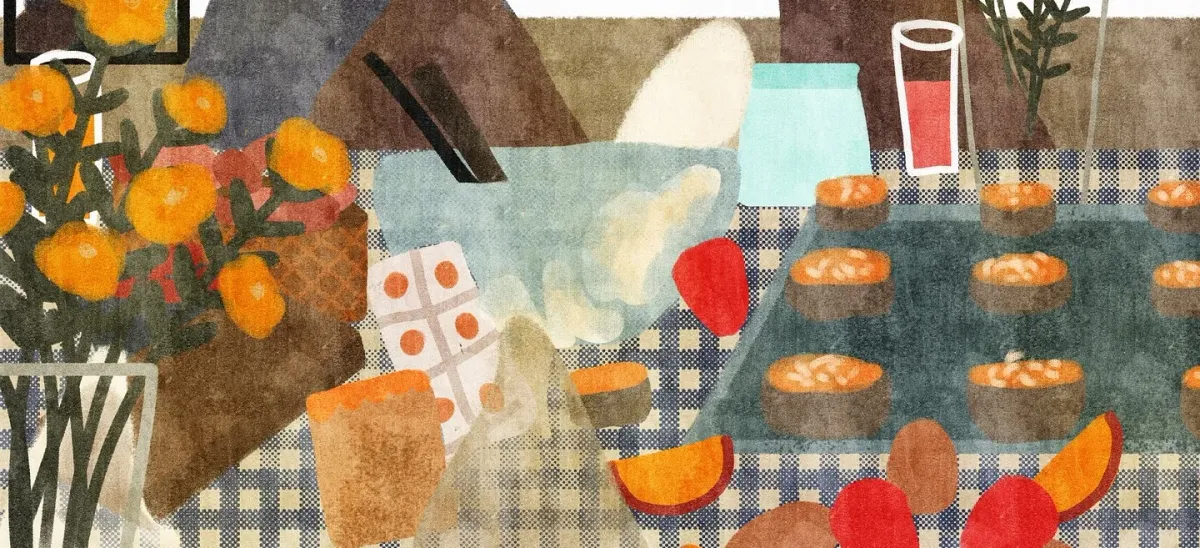Reigniting the Fire in my Kitchen: How I Reclaimed my Love for Cooking as a Disabled Woman
The choice was never between being a domestic goddess and a total exile from the kitchen. It was about going at my own pace, without fear.

Access the Audio Read version of this article directly on Spotify for Podcasters.
"In recent years, in between extreme diets for illness redemption and periods of being bed bound, I viewed food only as fuel and cooking as nothing but an energy drain."
I’ve inherited my shaking hands from my mother. It accounts for both of our clumsiness. When I lived at home, I was protective of her, ever conscious of her aloneness, burdening myself with worry. She wanted to buy a Madeline, to get those thin slices of potato to layer on top of her casseroles. I forbade her; we argued in John Lewis. I had tended to gashes in her fingers, wiped blood from the kitchen sink too many times to know that she couldn’t be trusted with such a sharp object. I won in the end — her casseroles are still delicious.
Now, we live in separate countries, and in my own kitchen, I have taken on new habits. That is to say, the habit of not cooking at all. I used to ring for advice; how long to poach an egg, what to thicken my gravy with, but now there is little to discuss.
In my small Dutch kitchen, I have this one red stool, splattered in paint (and pasta sauce) that sits next to my kitchen window. I use it to rest whilst I cook, which isn’t very often, but I like the option. There is safety in knowing I don’t have to stand and stir. But last year, I made a New Year’s resolution to use some of my limited capacity to feed myself, to cook again, because I used to love it. In recent years, in between extreme diets for illness redemption and periods of being bed bound, I viewed food only as fuel and cooking as nothing but an energy drain.
My partner cooks most of the time. I create the meal plan for the week, send him to the market with a scribbled list. I organise the fridge, clean out the old jars, but rarely do I make something from start to finish. If he is out at work, I will graze. A packet of crisps, leftover pasta bake, fruit on its last legs from the bottom of the bowl. I am capable of making something, however — I am just afraid.
In Rebecca May Johnson’s recent essay collection, Small Fires, she explores what it means to cook. What a cook is to a chef, what a woman is to the kitchen, what a feeder is to the fed. She asks herself “Can I only appreciate cooking through the imagination of others? It is hard when completely alone to contemplate feeding myself because it means locating my own desires in isolation to serve them - which is the thing I find most difficult, most alien.”
And I think that may be true, at least partly for me too. I deny myself the joy of cooking to feed only me, in fear of the consequences it may bring. There are no guarantees with chronic illness, so I cannot equate making myself a meal to a flare in pain, although sometimes it feels that way. Any activity, cooking and eating included, is punished by a symptom, a new tidal wave of discomfort. The pay off doesn’t seem worth it, if I am not also serving someone else.
That rewiring is hard to undo, but as the summer fades and the cold months are stretching ahead, returning to the kitchen sounds good, comforting — warm. I sit on my red stool next to my partner as he moves deftly around me, I am reminded that here is more his domain than mine. He instructs me on his systems. The tall wooden spoons are for savoury mixing, the short squat ones are saved for sweet stirring; porridge and the like. He has developed his own set of rituals in the year he has spent here, cooking without me.
In some ways it could be conceived as revolutionary, the man in my house is also the domestic worker. But that relies on the belief that one gender still belongs in the kitchen, and counter to that, those lucky women who have turned the tide have escaped some kind of shackle. Johnson notes: “The choice is not between burning down the kitchen or revisiting it in a nostalgic dream-state; that is a false binary. It is bad faith to burn your grandmother’s archive because she wasn’t as free as you.” It wasn’t a deliberate choice, no definant act of feminism, to have my boyfriend making my dinners. It was born of necessity, exhaustion, fear.
Now I am attempting to move past lingering negativity. The exhaustion remains but I am reframing cooking as a worthwhile act of joy, something to carve out space for in my week. On the weekend, that same boyfriend who cooks and cleans also completes long runs, multiple hours in length. He gets up whilst I am still dreaming, and I rise to an empty bed. So I place my red stool in front of the countertop. I slice strawberries in neat slithers, I crack eggs into a mug, I soak toast in batter, and fry the slices in copious amounts of butter. I eat my portion alone on the balcony. Welcome him home to a breakfast plate yet still, he does the washing up.
The choice was never between being a domestic goddess and a total exile from the kitchen. It was always about putting myself first, going at my own pace. And now by slowly reclaiming my love for cooking, I’ve relighted my own kitchen, reignited my fire, and I can feel the warmth.





